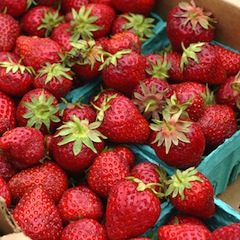Organic strawberries are organic, right?
Yes and no…
 While organic crops are grown without conventional pesticides and other chemicals, berry “starts” are treated as non-fruiting nursery plants and they can be treated with chemicals at that stage and still be considered organic once they are moved organic land and grown to fruiting stage.
While organic crops are grown without conventional pesticides and other chemicals, berry “starts” are treated as non-fruiting nursery plants and they can be treated with chemicals at that stage and still be considered organic once they are moved organic land and grown to fruiting stage.
The National Organic Program (NOP) standards for seeds and planting stock – which have not been updated since they were created in 2002 – allow conventional stock to be used wherever organic stock is not “commercially available.”
It appears that organic strawberry starts are not available, so conventional stock will do. Even when organic starts were available, berry producers chose not to buy them. The only grower of organic strawberry starts had to close his doors in 2010 because no one would buy his plants at a small premium over conventional plants.
Rachel Gross, of the San Francisco Bay Citizen, dives into the problem in Organic Strawberries? Not So Much
Weeds, insect pests, and disease can make commercial production of strawberries challenging; to prevent crop loss growers apply a variety of pesticides: herbicides, insecticides, and fungicides. It’s that use of pesticides that gives strawberries the #3 post on the Environmental Working Group’s Dirty Dozen list of fruits and vegetables. As many as 13 different pesticides were detected on a single sample of conventional strawberries.
In the meantime, what’s a consumer to do?
- Buy strawberries grown somewhere other than California, since the California Department of Pesticide Regulation approved the use of methyl iodide – a potent carcinogen and water contaminant – on the state’s strawberry fields.
- Ask your grower/farmer where his starts came from? Are they organic or are they conventional? You’ll need to decide at that point if you’re comfortable with plants that have been “conventional” at one point in their lives.
- Consider growing your own. The good news is that strawberries are one of the easiest fruits to grow – and they “propagate vegetatively” by creating runners and new little plants. You can be sure that the new plants are organic. The bad news: they need a lot of hot sun to develop good flavor so pick your garden spot carefully.
